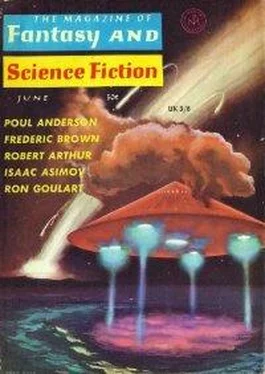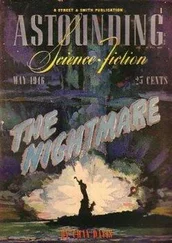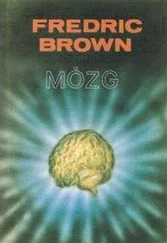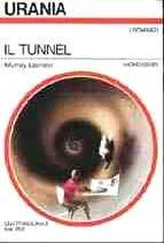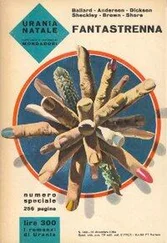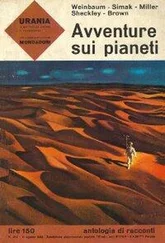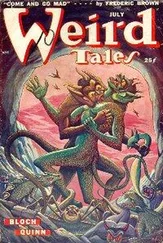Fredric Brown - Eine Kleine Nachtmusik
Здесь есть возможность читать онлайн «Fredric Brown - Eine Kleine Nachtmusik» весь текст электронной книги совершенно бесплатно (целиком полную версию без сокращений). В некоторых случаях можно слушать аудио, скачать через торрент в формате fb2 и присутствует краткое содержание. Год выпуска: 1965, Издательство: Mercury Press, Inc., Жанр: Фантастика и фэнтези, на английском языке. Описание произведения, (предисловие) а так же отзывы посетителей доступны на портале библиотеки ЛибКат.
- Название:Eine Kleine Nachtmusik
- Автор:
- Издательство:Mercury Press, Inc.
- Жанр:
- Год:1965
- ISBN:нет данных
- Рейтинг книги:3 / 5. Голосов: 1
-
Избранное:Добавить в избранное
- Отзывы:
-
Ваша оценка:
- 60
- 1
- 2
- 3
- 4
- 5
Eine Kleine Nachtmusik: краткое содержание, описание и аннотация
Предлагаем к чтению аннотацию, описание, краткое содержание или предисловие (зависит от того, что написал сам автор книги «Eine Kleine Nachtmusik»). Если вы не нашли необходимую информацию о книге — напишите в комментариях, мы постараемся отыскать её.
Eine Kleine Nachtmusik — читать онлайн бесплатно полную книгу (весь текст) целиком
Ниже представлен текст книги, разбитый по страницам. Система сохранения места последней прочитанной страницы, позволяет с удобством читать онлайн бесплатно книгу «Eine Kleine Nachtmusik», без необходимости каждый раз заново искать на чём Вы остановились. Поставьте закладку, и сможете в любой момент перейти на страницу, на которой закончили чтение.
Интервал:
Закладка:
Somehow the oil lamp seemed to dim itself without completely going out, and the music, growing wilder now, seemed to come from somewhere else, as though the musician were no longer in the room, and Dooley thought that that was considerate of him. Soon he was romping with the girls in reckless abandon, sampling here and there like a small boy in a candy store. Or a Roman at an orgy, but the Romans never had it quite so good, nor the gods on Mount Olympus.
At last, wonderfully exhausted, he lay back on the bed, and surrounded by soft, fragrant girlflesh, he slept.
And woke, suddenly and completely and soberly, he knew not how long later. But the room was cold now; perhaps that was what had wakened him. He opened his eyes and saw that he was alone on the bed and that the lamp was again (or still?) burning normally. And the musician was there too, he saw when he raised his head, sound asleep in the rocking chair. The instrument was gripped tightly in both hands and that long red and yellow striped muffler was still around his scrawny neck, his head tilted backward against the rocker’s back.
Had it really happened? Or had the music put him to sleep, so he’d dreamed it about the girls? Then he put the thought aside; it didn’t matter. What mattered, all that mattered, was that he was not leaving here without the hautboy. But did he have to kill to get it? Yes, he did. If he simply stole it from the sleeping man he wouldn’t stand a chance of getting out of Germany with it. Otto even knew his right name, as it was on his passport, and they’d be waiting for him at the border. Whereas if he left a dead man behind him, the body—in an abandoned house—might not be found for weeks or months, not until he was safe back in America. And by then any evidence against him, even his possession of the instrument, would be too thin to warrant extradition back to Europe. He could claim that Otto had given him the instrument to replace the clarinet he’d lost in saving Otto’s life. He’d have no proof of that, but they’d have no proof to the contrary.
Quickly and quietly he got off the bed and tiptoed over to the man sleeping in the rocker and stood looking down at him. It would be easy, for the means were at hand. The scarf, already around the thin neck and crossed once in front, the ends dangling. Dooley tiptoed around behind the rocker and reached over the thin shoulders and took a tight grip on each end of the scarf and pulled them apart with all his strength. And held them so. The musician must have been older and more frail than Dooley had thought. His struggles were feeble. And even dying he held onto his instrument with one hand and clawed ineffectually at the scarf only with the other. He died quickly.
Dooley felt for a heartbeat first to make sure and then pried the dead fingers off the instrument. And held it himself at last.
His hands held it, and trembled with eagerness. When would it be safe for him to try it? Not back at his hotel, in the middle of the night, waking other guests and drawing attention to himself.
Why, here and now, in this abandoned house, would be the safest and best chance he’d have for a long time, before he was safely out of the country maybe. Here and now, in this house, before he took care of fingerprints on anything he might have touched and erased any other traces of his presence he might find or think of. Here and now, but softly so as not to waken any sleeping neighbors, in case they might hear a difference between his first efforts and those of the instrument’s original owner.
So he’d play softly, at least at first, and quit right away if the instrument made with the squeaks and ugly noises so easy to produce on any unmastered instrument. But he had the strangest feeling that it wouldn’t happen that way to him. He knew already how to manage a double reed; once in New York he’d shared an apartment with an oboe player and had tried out his instrument with the thought of getting one himself, to double on. He’d finally decided not to because he preferred playing with small combos and an oboe fitted only into large groups. And the fingering? He looked down and saw that his fingers had fallen naturally in place over the finger-holes or poised above the keys. He moved them and watched them start, seemingly of their own volition, a little finger-dance. He made them stop moving and wonderingly put the instrument to his lips and breathed into it softly. And out came, softly, a clear, pure middle-register tone. As rich and vibrant a note as any Otto had played. Cautiously he raised a finger and then another and found himself starting a diatonic scale. And, on a hunch, made himself forget his fingers and just thought the scale and let his fingers take over and they did, every tone pure. He thought a scale in a different key and played it, then an arpeggio. He didn’t know the fingerings, but his fingers did.
He could play it, and he would.
He might as well make himself comfortable, he decided despite his mounting excitement. He crossed back to the bed and lay back across it, as he had lain while listening to the musician play, with his head and shoulders braced up against the wall behind it. And put the instrument back to his mouth and played, this time not caring about volume. Certainly if neigh-bors heard, they’d think it was Otto, and they would be accustomed to hearing Otto play late at night.
He thought of some of the tunes he’d heard in the wine cellar, and his fingers played them. In ecstasy, he relaxed and played as he had never played a clarinet. Again, as when Otto had played, he was struck by the purity and richness of the tone, so like the chalumeau register of his own clarinet, but extending even to the highest notes.
He played, and a thousand sounds blended into one. Again the sweet melody of paradoxes, black and white blending into a beautiful radiant gray of haunting music.
And then, seemingly without transition, he found himself playing a strange tune, one he’d never heard before. But one that he knew instinctively belonged to this wonderful instrument. A calling, beckoning tune, as had been the music Otto had played when the girls, real or imaginary, had click-clicked their way to him, but different this—was it a sinister instead of a sensual feeling underlying it?
But it was beautiful and he couldn’t have stopped the dance of his fingers or stopped giving it life with his breath if he’d tried.
And then, over or under the music, he heard another sound. Not this time a click-click of high heels but a scraping, scrabbling sound, as of thousands of tiny clawed feet. And he saw them as they spilled suddenly out of many holes in the wood-work that he had not before noticed, and ran to the bed and jumped upon it. And with paralyzing suddenness the bits and pieces fell into place and by an effort that was to be the last of his life Dooley tore the accursed instrument from his mouth, and opened his mouth to scream. But they were all around him now, all over him: great ones, tawny ones, small ones, lean ones, black ones… And before he could scream out of his opened mouth the largest black rat, the one who led them, leaped up and closed its sharp teeth in the end of his tongue and held on, and the scream aborning gurgled into silence.
And the sound of feasting lasted far into the night in Hamelin town.
Интервал:
Закладка:
Похожие книги на «Eine Kleine Nachtmusik»
Представляем Вашему вниманию похожие книги на «Eine Kleine Nachtmusik» списком для выбора. Мы отобрали схожую по названию и смыслу литературу в надежде предоставить читателям больше вариантов отыскать новые, интересные, ещё непрочитанные произведения.
Обсуждение, отзывы о книге «Eine Kleine Nachtmusik» и просто собственные мнения читателей. Оставьте ваши комментарии, напишите, что Вы думаете о произведении, его смысле или главных героях. Укажите что конкретно понравилось, а что нет, и почему Вы так считаете.
